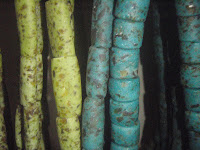- April 8: evacuated from Mali with all other Peace Corps volunteers, flown to Accra, Ghana
- April 12: got a tip from an old acquaintance about an internship opportunity in Ouagadougou, Burkina Faso April 13: closed my service with Peace Corps and traveled with friends around Ghana for a while, got offered and accepted the internship I had learned about less than 24 hours before
- April 21: arrived back in the US and drove straight from the airport to the hospital in Longview to meet my adorable and brand-new niece, Finley
- rest of April and May: hung out with family and friends, prepare for moving back to West Africa, spoke at a bunch of different schools about my experiences in Mali
- May 22ish: found out I will be flying back to Accra before I start working in Ouaga
- June 3: arrived back in Ghana
- June 4: started work at West Africa Trade Hub on the Home Decor and Fashion Accessories team
- June 5: found out I would be staying in Ghana and doing a few trips up to Ouaga due to changes in my work
So, now that I've got you a little up to speed:
I'm living in working in Osu, which is a pretty busy part of Accra, but also pretty cool. I can walk to work in about 20 minutes and usually do (unless I'm going out into the field, in which case I get picked up on the way), and try to leave work in time to get home before dark. I often fail. My work is pretty cool, although not even close to what I thought I would be doing before I took this internship. Most of the time I'm in the office, and right now we're preparing for an exporter training workshop in Abidjan, Côte D'Ivoire (http://www.africa-now.org/news/export-workshop-artisanal-sector), so things are pretty busy. My favorite part, though, is going out into the field. I've only done it a few times, but I love going out to where the artisans work and/or the businesses are run. I have discovered an addiction to Ghanaian glass beads. I'm pretty sure that I've spent more on beads in the last 2 weeks than I've spent on food in the month that I've been here.

Oops. Priorities I guess.
I was initially disappointed that I was going to be based in Accra instead of Ouaga, because I had this idea in my head that it was going to be kind of like going back to Mali. I knew that that wasn't really true, but Burkina is far more like Mali than Ghana, and, well, I had packed like I was going there.
The most visible difference is dress. I brought all my nicer complets with me this time, but rarely wear them since virtually no one else in my office does. It's so much more western here, and I really miss my shoes.... Fortunately, I have now bought some new-to-me ones. :) Unfortunately, I find the clothes to be too expensive in this part of town, so I don't have new clothes, only new shoes. Hopefully that will change soon, as I've entreated some of my co-workers to take pity on me and show me where the more affordable shopping options are. Another notable thing about dress is also related to the more western style here: people show their knees ALL THE TIME. I am constantly scandalized and then have to remind myself that it's not scandalous here. I still feel uncomfortable when mine show, don't worry.
Also much more visible in Accra, especially in the part of town where I live, are all the foreigners. Even in Bamako, I could spend a whole day walking around town and only see a handful of other white people, but here we're everywhere. This may sound weird, but I feel like I stand out more somehow because there are so many of us. In fact, I keep wanting to type 'them' instead of 'us.' I think it all traces back to when I was living in village, and I would forget that I looked so different until I saw a picture, because I wasn't ever looking at me otherwise. The impact of my paleness is further amplified by my lack of local knowledge. I had gotten so used to first appearing to be just another tubob, but then being able to converse comfortably in Bambara and being treated more normally. Here on the other hand, all I can say in the local language is 'thank you.' It's a start.
I am truly enjoying myself though. I've found a red-red (spicy beans with plantains) lady a short walk from my office, am making friends, and like my work. I'm pretty excited for what the next 4 months will bring.